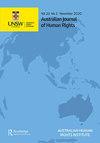COVID-19护照和难民:新兴的排斥和流动不公正的边境技术
Q1 Arts and Humanities
引用次数: 1
摘要
2019冠状病毒病(COVID-19)全球大流行导致前所未有的国家边境关闭,以及对国家内部和国家之间人员流动的新限制激增。本文探讨了澳大利亚境内外一项COVID-19应对措施对难民和寻求庇护者的人权影响,即采用COVID-19疫苗接种护照制度。我们认为,2021年COVID-19护照系统的使用加剧并巩固了疫苗丰富的全球北方和疫苗匮乏的全球南方国家和人民之间以及特定国家内公民和非公民之间日益加剧的不平等。利用“流动不公正”和“免疫特权”的概念,我们探讨了COVID-19护照系统如何为难民获得庇护、行使其流动权和实现其健康权造成特别额外的障碍。因此,我们呼吁继续警惕COVID-19护照系统在未来全球大流行或紧急情况下可能被重新部署,从而损害澳大利亚和全球的难民、寻求庇护者和无证人员,即使它被吹捧为保护人口、开放国际旅行和给予更大自由的手段。本文章由计算机程序翻译,如有差异,请以英文原文为准。
COVID-19 passports and refugees: an emerging border technology of exclusion and mobility injustice
ABSTRACT The global COVID-19 pandemic has seen unprecedented state border closures and a proliferation of novel restrictions on human mobility both within and between states. This article examines the human rights implications for refugees and asylum seekers of one COVID-19 response measure within and beyond Australia: namely, the adoption of COVID-19 vaccination passport systems. We argue that the use of COVID-19 passport systems in 2021 intensified and entrenched the growing inequalities between states and people in the vaccine-rich Global North and vaccine-deprived Global South as well as between citizens and non-citizens within particular states. Using the concepts of ‘mobility injustice’ and ‘immunoprivilege’, we explore how COVID-19 passport systems created particular additional barriers for refugees to access asylum, to exercise their right to mobility and to realise their right to health. We thus call for ongoing vigilance against the potential for COVID-19 passport systems to be redeployed in future times of global pandemics or emergencies to the detriment of refugees, asylum seekers and undocumented people, both in Australia and globally, even while being touted as a means of protecting populations, opening international travel and granting greater freedoms.
求助全文
通过发布文献求助,成功后即可免费获取论文全文。
去求助
来源期刊

Australian Journal of Human Rights
Arts and Humanities-History
CiteScore
1.30
自引率
0.00%
发文量
43
期刊介绍:
The Australian Journal of Human Rights (AJHR) is Australia’s first peer reviewed journal devoted exclusively to human rights development in Australia, the Asia-Pacific region and internationally. The journal aims to raise awareness of human rights issues in Australia and the Asia-Pacific region by providing a forum for scholarship and discussion. The AJHR examines legal aspects of human rights, along with associated philosophical, historical, economic and political considerations, across a range of issues, including aboriginal ownership of land, racial discrimination and vilification, human rights in the criminal justice system, children’s rights, homelessness, immigration, asylum and detention, corporate accountability, disability standards and free speech.
 求助内容:
求助内容: 应助结果提醒方式:
应助结果提醒方式:


